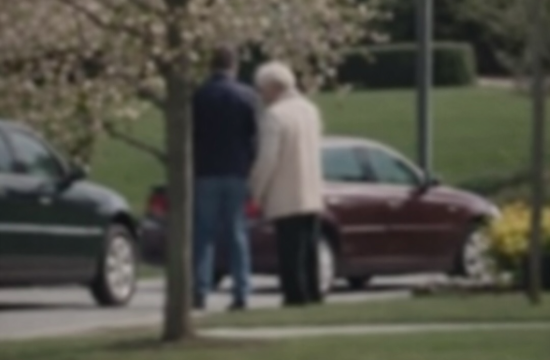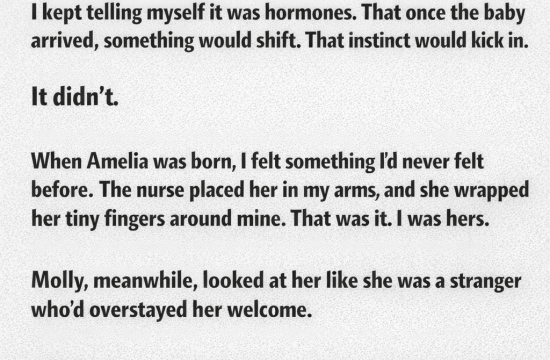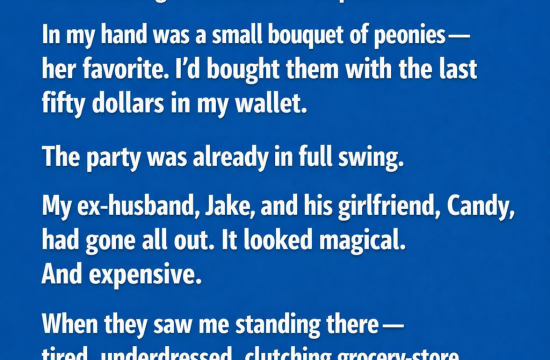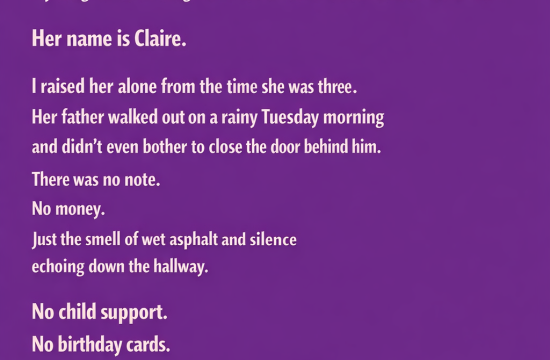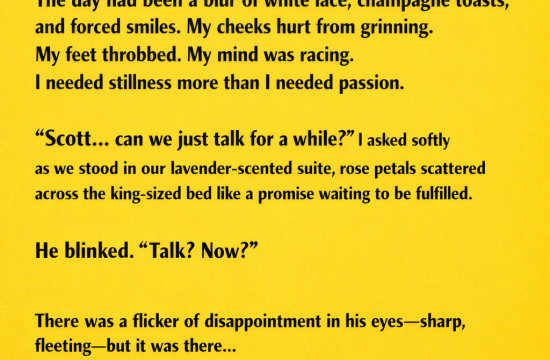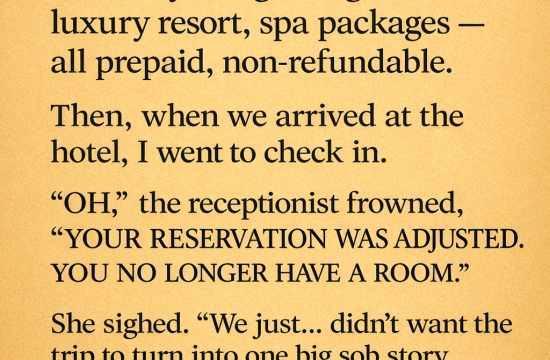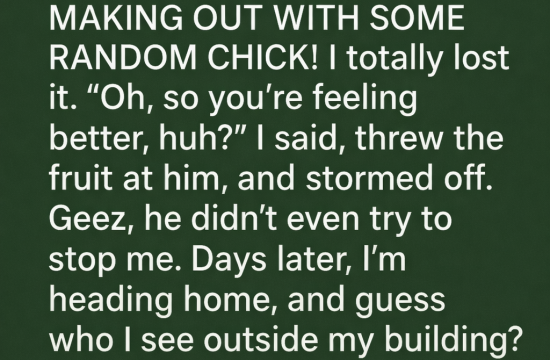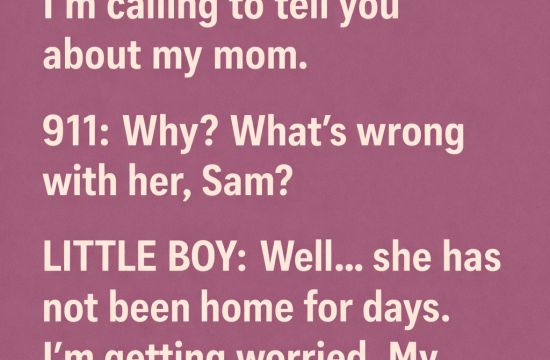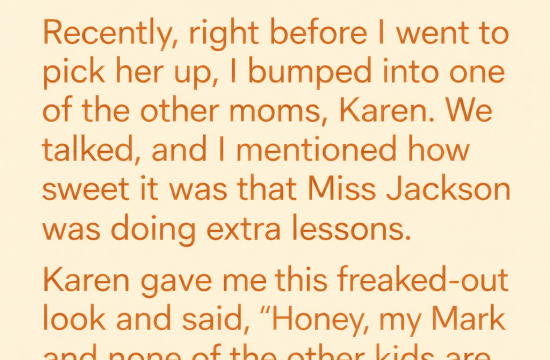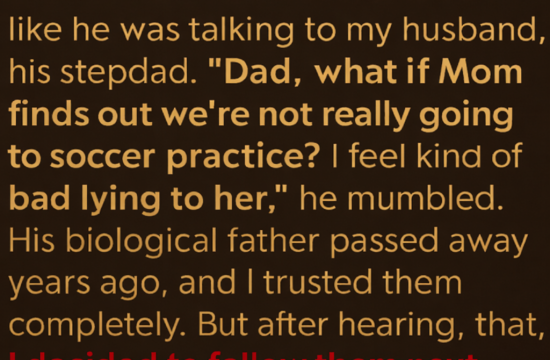At 24, I became a widow with three kids. Earning minimum wage, I had no choice but to ask my mother if we could move in with her.
She refused.
“My boyfriend wouldn’t like it,” she said.
Seventeen years later, that same woman stood on my doorstep.
She was alone. Homeless. Her voice trembled:
“My boyfriend had a stroke last year. He gambled everything away before he passed. I have nowhere else to go.”
I stared at her, barely recognizing the woman who once slammed a door in my face. Her hair was thinner, her eyes sunken, and yet it was her voice—frail, humbled—that shook me the most.
In a second, I was back in those long nights rocking a crying baby, scrubbing dishes after double shifts, stretching a can of beans across three meals. I remembered my daughter asking why Grandma didn’t love us.
“I need time,” I told her.
She nodded and sank onto the porch steps, clutching a stained canvas bag—her whole life reduced to one soft, collapsing rectangle. My youngest, Laramie, peeked through the blinds. He’d never met her. He was only three months old when Silas died in that crash. My older two, Cordelia and Renly, only knew the stories I’d told them.
When I closed the door, a storm of emotions crushed into one another—anger, pity, confusion… but also a thin thread of hope. Could something broken for nearly two decades ever be pieced back together?
That night, the kids circled me with questions.
“Why was she crying?” Cordelia whispered.
“Is she staying here?” Renly asked.
I told them the truth. “That’s my mom. She didn’t help us when we needed her. Now she needs help.”
Sleep avoided me. I lay awake remembering the charities, the Christmases where no one came, the teachers who quietly slipped extra sandwiches into backpacks, the strangers who left bags of clothes at our door. The years of survival. The years of silence.
At dawn, I made coffee. My hands shook as I pushed open the door.
She was still there, curled under a thin blanket.
“Mom,” I said gently.
She stirred, eyes swollen from crying.
“Come inside. Let’s talk.”
She stepped into my home like she was stepping into a museum of the life she wasn’t part of—Cordelia at prom, Renly in his football jersey, Laramie with a science fair ribbon. She paused at my wedding photo. Her hand trembled.
“I’m sorry,” she whispered.
I sat her down. “Why did you leave us?” I asked.
Her face crumbled.
“I was scared. I loved that man too much. He said no kids, no baggage. I thought he was my last chance at happiness. I was selfish.”
I felt something inside me snap and soften at the same time.
“I was your kid,” I said. “You chose him over me—and your grandkids.”
She nodded, crying silently. For once, there was no defense. Just the plain truth, raw and ugly.
I let her sleep on the couch that night. She offered to cook and clean—at first, I brushed her off. But then I saw the way she folded Laramie’s socks with reverence, how she teared up when Cordelia talked about college. Slowly, the armor I’d welded around my heart began to crack.
One morning, I took her to work at the diner. She offered to wash dishes. She wasn’t strong enough for the heavy trays, but she tried so hard that even my boss said, “Your mom’s got grit.”
That night, she told the kids stories about me as a child. Cordelia and Renly laughed. Laramie curled beside her like he’d known her all his life. I watched from the doorway, something heavy and aching expanding in my chest.
But healing wasn’t linear.
She had nightmares. Sometimes she stared off into the distance, guilt gnawing at her. One evening, I overheard her whisper on the phone, “She doesn’t have to forgive me. I don’t deserve it.”
Then my brother, Carsten, called after a decade of silence.
“I heard she’s with you,” he said flatly. “Don’t trust her. She’ll take advantage.”
His words dug under my skin. That night, I confronted her.
“Are you here for money?”
Her face broke.
“No. I came because you’re the only person who might still care. I don’t want your money. I want your forgiveness.”
And then she told me everything.
How she used to drive by the diner just to see me walk out.
How she dropped groceries at our door under fake names.
How she followed school fundraisers online and paid anonymously for Cordelia’s field trips.
All those years I thought she didn’t care—she had been loving us from a distance, in cowardly, quiet, broken ways.
The next morning, I offered her the spare room. The kids erupted with joy. Cordelia baked a cake. Renly gave her his favorite blanket. Laramie whispered “Grandma,” like it tasted new and sweet.
Life settled. She helped with dinner. Waited up for me after late shifts. The kids clung to her.
But old wounds still bled sometimes.
One night, she criticized how I disciplined Laramie.
“You lost the right to tell me how to parent,” I snapped.
She nodded with tears in her eyes.
“You’re right.”
The silence that night was heavy.
The next morning, I found a note under my mug:
“I’m so proud of the mother you are. Please forgive me.”
A month later, a letter came from her late boyfriend’s attorney. A small life insurance payout. She pressed the check into my hand.
“For the kids. College, braces… whatever they need.”
I wanted to refuse. Pride battled practicality.
But I used it—Cordelia’s college fund, Renly’s braces, savings for Laramie.
A weight I didn’t realize I’d been carrying slid off my shoulders.
Carsten visited not long after.
“You’re letting her off too easy,” he muttered.
But when he saw her—frail, remorse carved into her face—his anger dissolved. That night, they held each other and cried. Forgiveness didn’t come from a single moment. It came from a hundred small ones.
Mom’s health worsened. Heart failure.
The kids pushed her wheelchair to the park. Read her books. Snuck her chocolate. One quiet summer night, she called me into her room.
“You gave me a second chance,” she whispered. “You showed me what family really means.”
I held her hand. “I love you.”
She passed the next morning, soft as a sigh.
We buried her under a wildflower tree. At the service, Cordelia stood and said,
“Grandma taught me it’s never too late to say sorry… or to forgive.”
Months later, Cordelia got into her dream college.
Renly’s braces came off—his smile finally effortless.
Laramie won a writing contest—for a story about the grandmother he didn’t know he needed.
I still work at the diner, but I’m taking online classes now. Because of her. Because of that last, trembling whisper:
“You can be more.”
Last week, Carsten called.
He named his newborn daughter after our mom.
“I never thought I’d forgive her,” he said. “But watching you… you showed me how.”
The legacy she left wasn’t money or belongings.
It was proof—living, breathing proof—that even the deepest wounds can mend. That forgiveness, real forgiveness, is messy, painful, imperfect… but freeing.
If you’re reading this, remember:
It’s never too late to apologize.
Never too late to forgive.
And never too late to start again.


